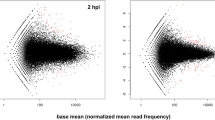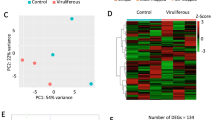Abstract
INSECTS of the family Aphidae and particularly the apple aphid, Aphis pomi DeGeer, have long been suspect as significant vectors of the phytobacterial pathogen Erwinia amylovora (Burrill) Winslow et al., 1920. That these insects could artificially transmit the fireblight bacterium and establish progressive infections in apple and pear tissue was demonstrated by Stewart1, Stewart and Leonard2, and Merrill3.
This is a preview of subscription content, access via your institution
Access options
Subscribe to this journal
Receive 51 print issues and online access
$199.00 per year
only $3.90 per issue
Buy this article
- Purchase on SpringerLink
- Instant access to full article PDF
Prices may be subject to local taxes which are calculated during checkout
Similar content being viewed by others
References
Stewart, V. B., New York (Cornell) Agr. Exp. Sta. Bull., 329 (1913).
Stewart, V. B., and Leonard, M. D., Phytopath., 5, 273 (1915).
Merrill, J. H., J. Eco. Ent., 8, 402 (1915).
Mitler, T. E., and Dadd, R. H., Nature, 195, 404 (1962).
Strong, F. E., Science, 140, 983 (1963).
Author information
Authors and Affiliations
Rights and permissions
About this article
Cite this article
PLURAD, S., GOODMAN, R. & ENNS, W. Persistence of Erwinia amylovora in the Apple Aphid (Aphis pomi DeGeer), a Probable Vector. Nature 205, 206 (1965). https://doi.org/10.1038/205206a0
Published:
Issue date:
DOI: https://doi.org/10.1038/205206a0



